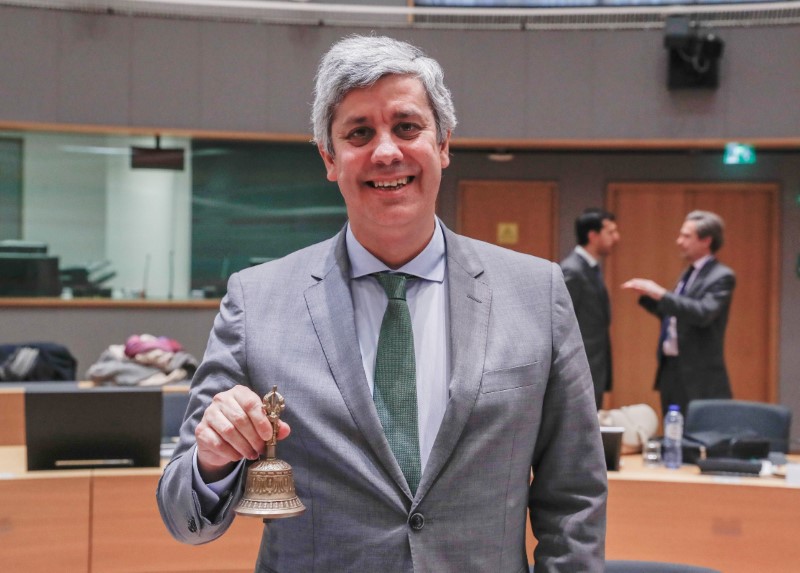
FILE PHOTO – President of the Eurogroup Mario Centeno rings a bell at the start of an eurozone finance ministers meeting in Brussels, Belgium, January 22, 2018. REUTERS/Yves Herman
March 22, 2018
By Jan Strupczewski
BUENOS AIRES (Reuters) – Plans for deeper euro zone integration need to marry ambition with pragmatism to progress on controversial ideas like a euro zone budget or limiting banks’ exposure to a single sovereign borrower, the chairman of euro zone finance ministers Mario Centeno said.
Euro zone leaders will discuss reform ideas on Friday, a “pit stop” on the way to June when they will decide on the scope and timetable of reforms, Centeno told Reuters in an interview.
“In June we need to be clear on the calendar and how far we want to go. If we put that down on paper, that will be a big achievement already,” he said on the sidelines of a G20 finance ministers’ meeting.
The range of reforms under discussion is impressively wide, but so far talks have not moved far because there was no new government in the key euro zone economy Germany until last week.
The euro zone is now focusing on just two reforms: the completion of its banking union, and the transformation of its bailout fund into a European Monetary Fund. Both contain highly contentious steps, however.
The most controversial of them is linked to setting up an EU-wide deposit guarantee scheme. Many euro zone countries say banks must first reduce the risks they are exposed to from lending to the private sector and to governments.
This means reducing the number of bad loans on their books, which is already happening, but also setting limits on the amount of bonds of a particular government a euro zone bank can hold, known as its “sovereign exposure”.
Such exposure limits would make a bank’s bond portfolio more diverse, making it more resilient to the potential default of any single government.
LET’S SEE WHAT IS POSSIBLE
But announcing such plans could also trigger sell-offs of some sovereign bonds and put European banks at a competitive disadvantage globally, if the rules applied only to European financial institutions.
Some also argue that buying government bonds by domestic banks has worked well for highly indebted countries such as Italy or Japan, keeping them safe from international capital flight.
Centeno said the issue of sovereign exposures was debated at the Basel Committee of banking supervisory authorities that dealt with global issues, adding that all concerns regarding the completion of the banking union would be taken into account.
“Let’s take (all banking union concerns) into account and discuss the sequencing, a phase-in cycle, that allows also in that dimension our risks to recede,” Centeno said.
“There will be very positive spillovers for everyone from this process and it will also help countries in which the exposures are larger or which have legacy problems,” he said.
Discussions on a euro zone budget, an idea backed by French President Emmanuel Macron but resisted by German Chancellor Angela Merkel, are equally sensitive.
Centeno said a pool of money for the euro zone would make sense from an economic point of view, but so far there were many different ideas and little agreement, except that the euro zone should not set up another system of transfers that already existed through the broader European Union budget.
“The new instruments – a rainy-day fund, a budget line, instruments for economic stabilization or unemployment insurance that the United States has – would make sense economically,” he said.
“So now we have to bring this discussion to the political level and try to see what is possible. Compromise occurs when ambition meets pragmatism, and that is what we are about to see in Europe hopefully,” Centeno said.
(Reporting by Jan Strupczewski; Editing by Hugh Lawson and David Stamp)

